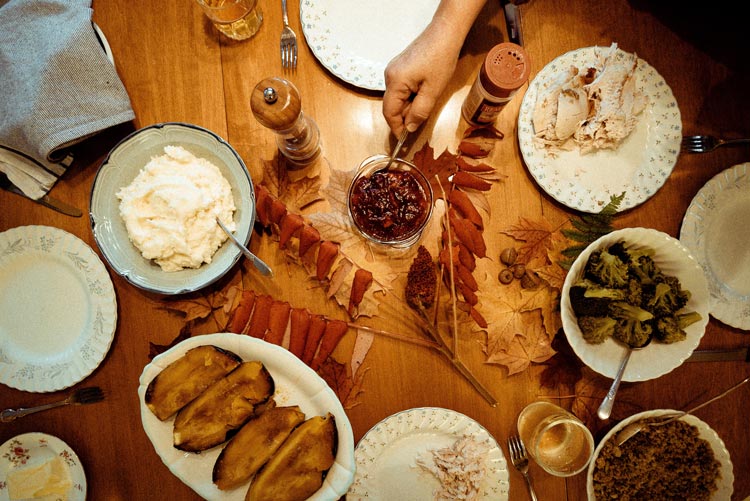Gratitude
 If this is your first Thanksgiving in recovery, there’s much to be grateful for. The skills you learned in St. Joseph Institute’s Pennsylvania drug and alcohol treatment center have built the foundation for a better life. Take some time to reflect on how far you’ve already come, then get ready to build an even brighter future.
If this is your first Thanksgiving in recovery, there’s much to be grateful for. The skills you learned in St. Joseph Institute’s Pennsylvania drug and alcohol treatment center have built the foundation for a better life. Take some time to reflect on how far you’ve already come, then get ready to build an even brighter future.
1. The Chance to Continue Improving
Even though some days are undoubtedly harder than others, the fact that you’re still here gives you much to celebrate. In the United States, alcohol kills over 88,000 people per year, while opioid abuse claims more than 72,000 lives. Newsweek reports that these deaths encompass people of all ages, races, and socioeconomic classes, although young women are increasingly struggling with substance abuse in recent years.
Whether a nearly fatal overdose was the “rock bottom” moment that spurred you to seek treatment or you realized you needed help before you put your life in danger, you now understand the threat that an untreated substance use disorder poses. Be grateful for the second chance you’ve been given.
2. Regaining Your Self-Respect and Self-Worth
Active abuse of drugs and alcohol tends to be accompanied by intense feelings of guilt and shame. Someone who has yet to seek treatment often feels that they’re unworthy of love and respect.
When you’re in recovery, you begin to know your self-worth. You learn that you are not defined by the mistakes you’ve made in the past or the trauma you have suffered. You’re a unique individual and in control of your own destiny. With this new sense of self-respect and self-worth, you can take steps to build the life you want and deserve.
3. Repairing Relationships with Family and Friends
Your relationships with family and friends may still be somewhat strained due to mistakes you’ve made in the past or to long-seated tensions, but the communication skills you’ve learned in recovery can help you make amends and rebuild trust. You may have felt you were alone when you were battling your addiction, but now you have a chance to see how much you mean to those around you.
If you’re a parent, one of the most important relationships in your life is undoubtedly with your child. Being in recovery gives you a chance to be the role model your son or daughter deserves. This can help you break the generational cycle of substance abuse, which is something to be grateful for in itself.
4. Improving Your Finances
There’s no doubt that maintaining an active addiction can get very expensive. From the high cost of drugs and alcohol to the damage addiction does to your career, it’s not uncommon to be heavily in debt by the time you decide to seek treatment.
Getting back on track may take time, but being in control of your finances again will provide you with peace of mind. Instead of wondering how you’ll manage from day to day, you’ll be able to pay your bills and save for long-term goals.
5. Getting in Touch with Your Creative Side
Art, music, and creative writing are often incorporated into recovery programs to help people with substance use disorders express their feelings and cope with painful emotions in a healthier way. Your experiences in residential treatment may have helped you rekindle old passions or discover a creative side you didn’t know you had.
Remember, creativity is about the process—not the product. You can be grateful for the chance to express yourself creatively even if you are still working to improve your skills as an artist, musician, or writer.
6. Developing Healthy Habits
Research shows that a lasting recovery involves more than simply abstaining from the use of addictive substances, which is why evidence-based treatment programs focus on nutrition, exercise, stress-relieving activities, and proper sleep habits as a way to ease withdrawal symptoms, manage cravings, and repair the damage caused by past drug or alcohol use. These healthy habits will continue to boost your energy levels and improve your mood long after you’ve left treatment.
Developing healthy habits also gives you a chance to share what you’ve learned with others—which is yet another reason to be grateful. Exercising or cooking nutritious meals with the people you care about is a way to strengthen your relationship and ensure that you’ll be able to make the most of each day together.
7. Connecting with the Recovery Community
Whether you’re participating in our relapse prevention and aftercare programs or attending a 12-Step group such as Alcoholics Anonymous, connecting with the recovery community helps you see that you are not alone in your journey to lasting sobriety. Learning from the experiences of others also provides a broader perspective on the challenges you’re facing.
Once you’re firmly established in your recovery, volunteering can be a wonderful way to show your gratitude. Providing transportation, helping to organize meetings, or becoming a 12-Step sponsor is a way to pay it forward and help someone else take those first crucial steps towards overcoming their addiction.
To learn more about SJI Pennsylvania holistic drug and alcohol rehab, and our programs, please contact us at (814) 228-8881.

